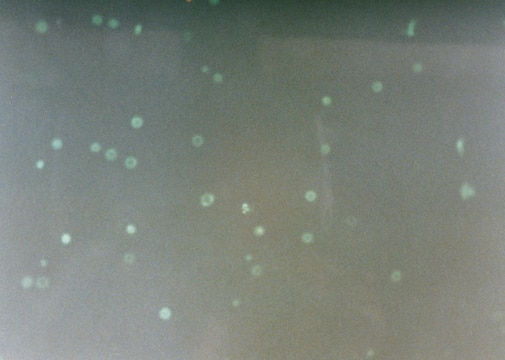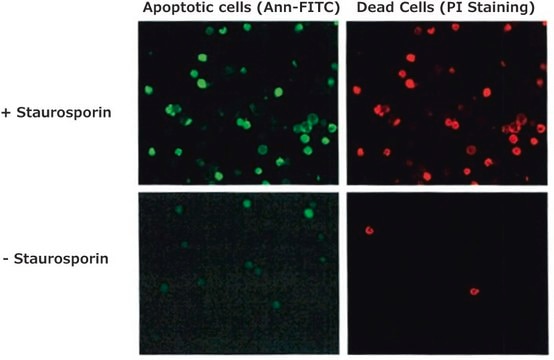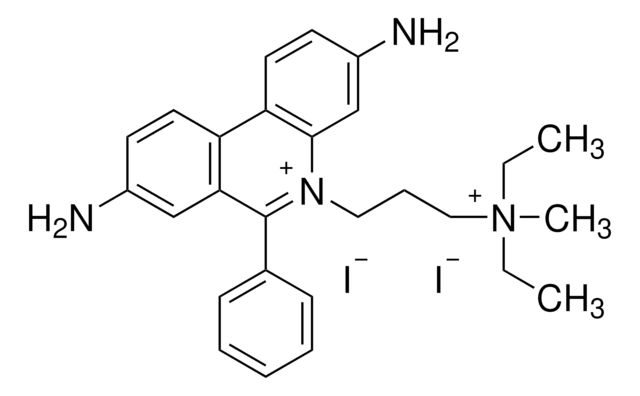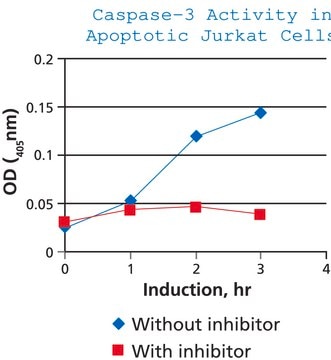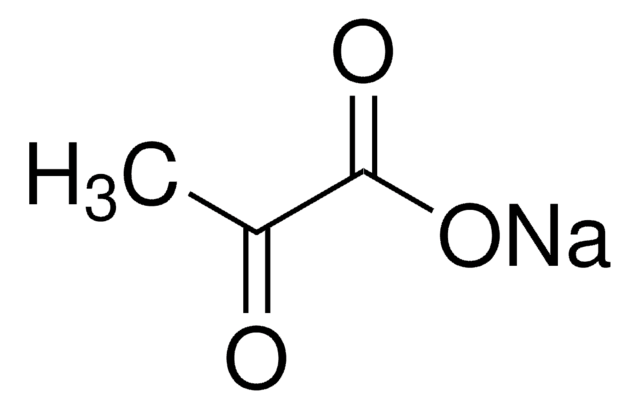A9460
Annexin V from human placenta
≥90% (SDS-PAGE), buffered aqueous solution
Synonym(s):
Annexin V, Calphosbindin I, Lipocortin V, PAP-1
Sign Into View Organizational & Contract Pricing
All Photos(1)
About This Item
UNSPSC Code:
41106305
NACRES:
NA.32
Recommended Products
Quality Level
assay
≥90% (SDS-PAGE)
form
buffered aqueous solution
mol wt
33 kDa (four subunits)
UniProt accession no.
shipped in
dry ice
storage temp.
−70°C
Gene Information
human ... ANXA5(308)
Looking for similar products? Visit Product Comparison Guide
Related Categories
Biochem/physiol Actions
Annexins are ubiquitous homologous proteins that bind phospholipids in the presence of calcium. The cellular changes involved in the apoptotic process include loss of phospholipid asymmetry during the early stages. This phenomenon is universal and is not limited to stimulus or to mammalian cells, but also occurs in insect and plant cells. In living cells, phosphatidylserine is transported to the inside of the lipid bilayer by the Mg2+ATP dependent enzyme, aminophospholipid translocase. At the onset of apoptosis, phosphatidylserine becomes translocated to the external surface of the cell membrane. Since the movement of phosphatidylserine from the internal membrane surface to the external surface is an early indicator of apoptosis, annexin V and its conjugates that interact strongly and specifically with phosphatidylserine may be used to detect apoptosis. Annexin V conjugates can be used to detect apoptotic cells significantly earlier than DNA-based assays. Fluorescent dye labeled annexin V have applications in flow cytometry, fluorescence microscopy, and laser scanning cytometry.
Packaging
Package size based on protein content
Physical form
Solution in 40 mM Tris-HCl, pH 7.5, containing 150 mM NaCl, 1 mM DTT and 0.05% sodium azide.
Storage Class
12 - Non Combustible Liquids
wgk_germany
WGK 2
flash_point_f
Not applicable
flash_point_c
Not applicable
Certificates of Analysis (COA)
Search for Certificates of Analysis (COA) by entering the products Lot/Batch Number. Lot and Batch Numbers can be found on a product’s label following the words ‘Lot’ or ‘Batch’.
Already Own This Product?
Find documentation for the products that you have recently purchased in the Document Library.
Customers Also Viewed
W J Buhl et al.
European journal of cell biology, 56(2), 381-390 (1991-12-01)
Membranes from human placenta contain proteins which inhibit the activity of phospholipases A2 by binding to phospholipid thus impeding substrate availability. We used unilamellar mixed liposomes and a partially purified cytosolic phospholipase A2 from placenta for characterizing this substrate-depleting activity.
B N Yamaja Setty et al.
Blood, 99(5), 1564-1571 (2002-02-28)
Phosphatidlyserine (PS) exposure on the erythrocyte surface endows the cell with the propensity of adhering to vascular endothelium. Because individuals with sickle cell disease (SCD) manifest loss of erythrocyte membrane asymmetry with PS exposure, we have assessed the contribution of
D D Schlaepfer et al.
Biochemistry, 31(6), 1886-1891 (1992-02-18)
Annexin V is a protein of unknown biological function that undergoes Ca(2+)-dependent binding to phospholipids located on the cytosolic face of the plasma membrane. Preliminary results presented herein suggest that a biological function of annexin V is the inhibition of
Yeast alcohol dehydrogenase: SH groups, disulfide groups, quaternary structure, and reactivation by reductive cleavage of disulfide groups.
M Bühner et al.
European journal of biochemistry, 11(1), 73-79 (1969-11-01)
Ke Chen et al.
Journal of biomedical science, 18, 57-57 (2011-08-17)
High glucose induced lipid synthesis leads to β cell glucolipotoxicity. Sterol regulatory element binding protein-1c (SREBP-1c) is reported to be partially involved in this process. Insulin induced gene-1 (Insig-1) is an important upstream regulator of Insig-1-SREBPs cleavage activating protein (SCAP)-SREBP-1c
Our team of scientists has experience in all areas of research including Life Science, Material Science, Chemical Synthesis, Chromatography, Analytical and many others.
Contact Technical Service